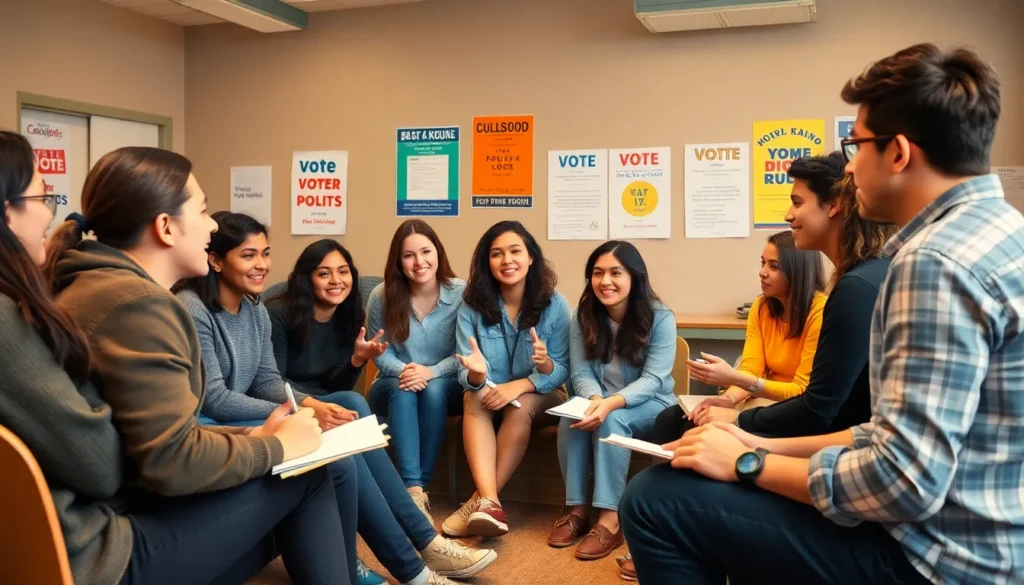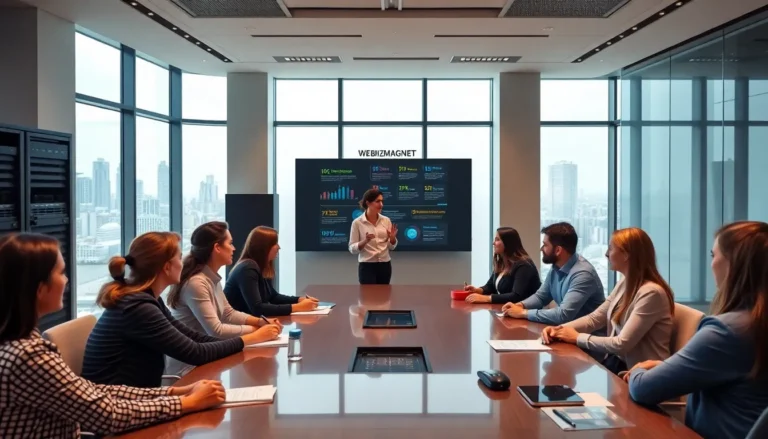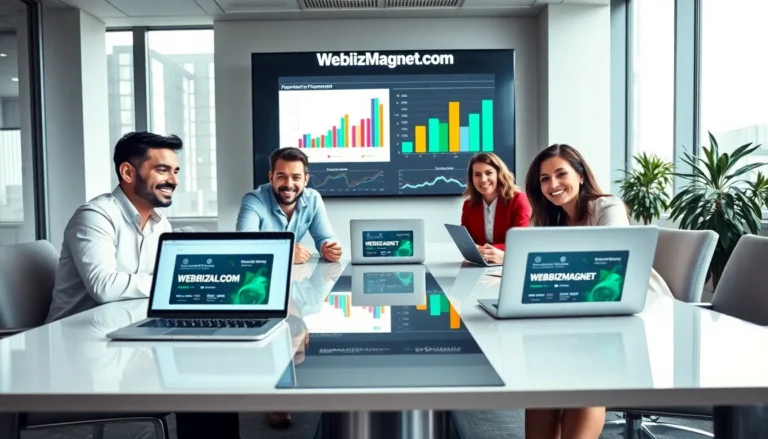Table of Contents
ToggleIn today’s fast-paced world, political literacy isn’t just a nice-to-have; it’s a must-have. Imagine navigating a maze blindfolded—that’s what it feels like for many when it comes to understanding politics. Without the right tools, they’re left guessing which way to turn. But fear not! Political literacy is here to save the day, turning confusion into clarity and apathy into action.
It’s not just about knowing who’s running for office or what a bill is; it’s about empowering individuals to engage meaningfully in their communities. With a dash of humor and a sprinkle of knowledge, political literacy can transform anyone into a savvy citizen. So buckle up, because diving into this topic might just make you the most interesting person at the next dinner party—who knew politics could be this fun?
Understanding Political Literacy
Political literacy equips individuals with the skills to navigate government processes and engage in civic discussions. This knowledge enables informed voting and community participation, essential for a thriving democracy.
Definition and Importance
Political literacy encompasses understanding political systems, rights, and responsibilities. It matters because informed citizens contribute more effectively to social discourse and public policy decisions. Citizens who grasp political concepts can apply critical thinking to assess candidates, evaluate policies, and advocate for social issues. This literacy increases civic engagement, resulting in stronger communities and more accountable governments. Studies show that politically literate individuals tend to participate in elections and civic activities more frequently.
Historical Context
The concept of political literacy has evolved over centuries. In ancient Greece, participation in democracy depended on a citizen’s ability to engage in discussions and debates. The Enlightenment further emphasized the importance of knowledge for responsible citizenship. During the 20th century, educational reforms integrated civic education to foster informed voters. Historical movements, such as civil rights campaigns, highlighted the necessity of understanding political systems to challenge injustices. Today, political literacy continues to adapt, reflecting changes in media and technology while remaining central to the democratic process.
Components of Political Literacy

Effective political literacy includes several key components that empower individuals. Critical thinking skills and knowledge of political systems play vital roles.
Critical Thinking Skills
Critical thinking skills enable individuals to analyze political information rigorously. Evaluating sources and separating facts from opinions becomes essential for informed decision-making. Engaging in discussions and debates also enhances these skills. Individuals must question assumptions and seek evidence to support their viewpoints. This disciplined approach fosters the ability to assess candidates and policies effectively. Additionally, critical thinkers can engage with complex political issues and advocate for changes that reflect their values.
Knowledge of Political Systems
Knowledge of political systems forms the foundation of political literacy. Understanding how different governance structures operate aids individuals in navigating the political landscape. Citizens need to grasp fundamental concepts, such as democracy, authoritarianism, and federalism. Awareness of the roles and responsibilities of various institutions, including legislatures and courts, empowers informed participation. Citizens equipped with this knowledge can engage meaningfully in civic activities. Familiarity with their rights also encourages individuals to hold authorities accountable, reinforcing the principles of democracy.
Benefits of Political Literacy
Political literacy offers several advantages that enhance participation in the democratic process. Understanding political systems and civic duties empowers individuals to navigate their roles in society effectively.
Informed Citizenship
Informed citizenship emerges as a key benefit of political literacy. Active participation in democracy relies on knowledge about rights and responsibilities. Equipped with this understanding, citizens engage in discussions, advocate for issues, and make educated voting decisions. Informed citizens critically analyze candidates and policies, allowing them to scrutinize motives and promises. This scrutiny fosters a sense of responsibility and encourages individuals to contribute positively to their communities. Citizens equipped with the knowledge of political structures have a better grasp of how policies impact daily life.
Enhanced Civic Engagement
Enhanced civic engagement results from increased political literacy. Communities thrive when individuals understand how to participate in local governance. Politically literate citizens are more likely to attend town hall meetings, join civic organizations, and volunteer for campaigns. Engaging in these activities establishes connections with others who share common interests and concerns. Awareness of specific issues drives citizens to advocate for change proactively, ultimately strengthening democratic processes. When communities collaborate on important matters, collective voices become more powerful, ensuring representation in public policy discussions.
Strategies to Improve Political Literacy
Improving political literacy requires targeted strategies. Educational programs and community initiatives play vital roles in enhancing understanding of political systems and processes.
Educational Programs
Structured educational programs offer valuable resources for individuals seeking to enhance their political knowledge. Schools often incorporate civics education into their curricula, training students to understand government functions and their civic responsibilities. Online courses also provide flexible learning options for adults, covering topics like political theory, critical thinking, and contemporary policy issues. Workshops and seminars hosted by universities and non-profit organizations further create learning opportunities, often featuring expert speakers from diverse political backgrounds. Developing critical thinking skills within these programs ensures participants can assess information reliably and engage thoughtfully in discussions.
Community Initiatives
Community initiatives foster political literacy through local engagement. Town hall meetings create spaces for citizens to interact directly with elected officials, encouraging dialogue about important issues. Grassroots organizations often host events focused on voter registration, educating attendees about the voting process and their rights. Social media campaigns also raise awareness, distributing valuable information on civic engagement to diverse audiences. Collaborations between local libraries and educational institutions often lead to workshops that address current political topics, enhancing community members’ ability to engage responsibly in civic matters. These initiatives empower individuals by creating collaborative environments for discussion and learning.
Challenges to Achieving Political Literacy
Achieving political literacy involves various hurdles that inhibit informed and engaged citizenship. Understanding these challenges can guide effective solutions.
Barriers to Access
Restricted access to educational resources prevents full participation in political discourse. Many communities face disparities in quality of education, limiting individuals’ exposure to critical civic knowledge. Internet access remains uneven, particularly in rural or low-income areas, further complicating opportunities for learning. Public libraries often serve as valuable hubs, yet not every citizen can leverage these resources consistently. Additionally, language barriers can exclude non-native speakers from critical discussions about rights and responsibilities.
Misinformation and Bias
Misinformation proliferates across digital platforms, complicating the pursuit of accurate political understanding. Social media often spreads unverified claims rapidly, leading citizens to form opinions based on false narratives. These platforms can also reinforce personal biases by creating echo chambers that limit exposure to diverse perspectives. Individuals may struggle to discern credible information from potential propaganda, leading to skewed perceptions of political realities. Media literacy programs are essential to counteract this trend, empowering citizens to critically evaluate information sources effectively.
Political literacy plays a crucial role in fostering engaged and informed citizens. It empowers individuals to navigate the complexities of governance and actively participate in their communities. With a solid understanding of political systems and critical thinking skills, citizens can make educated choices that influence public policy and social discourse.
As the landscape of information continues to evolve, enhancing political literacy remains vital. By addressing barriers to access and promoting educational initiatives, society can cultivate a generation of politically literate individuals. This commitment to informed citizenship not only strengthens democracy but also enriches community engagement. Ultimately, everyone has the potential to contribute meaningfully to political conversations, shaping a better future for all.







